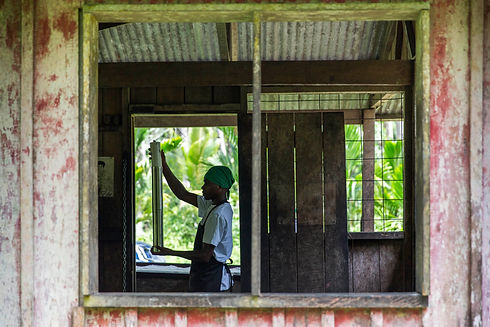BUSINESS MODEL
Direct Micro Expelling (DME) has two distinct business structures:
-
DME Units for family, small-scale farm, and village production.
-
DME Hubs which provide commercial services for owners of DME Units.
The best model for you depends on your skills, experience, and circumstances.

DME UNITS
DME Units process coconuts into products for sale.
Units are ideal for:
-
Farmers or families with coconut palms on their land.
-
Individuals, families, or villages with access to coconuts.
-
Entrepreneurs wishing to create a local business.
Coconuts are processed within a small purpose-built ‘Food Production Facility’, using a DME Kit of equipment. Kokonut Pacific (Australia) supplies Unit owners with their complete DME Kit and comprehensive instructions on building and setting up their facility. The Food Production Facility is built using local materials. An existing building with concrete floor can also be adapted and used.
DME Units can provide ongoing employment for four to six individuals, both men and women. Production can take place all year round and in most weather.
DME UNIT WORK-FLOW
The DME Kit’s construction manual and building specification pays particular attention to ‘work-flow’ relating to:
1. Nut splitting
2. Grating
3. Recording
4. Drying
5. Loading
6. Pressing
7. Storage
At maximum production, each 3.5kg batch of dried shredded coconut can be pressed into oil every 4-8 minutes, depending on skill and efficiency, producing approximately one (1) litre of virgin coconut oil (VCO).
With skilled workers (4-6 operators) you can produce up to 60 litres of oil per day.
View DME Unit Work-Flow Illustration
RETURN ON INVESTMENT
Existing DME Unit owners have received greater financial returns for their VCO and other products than they could get from producing copra.
This return comes through daily processing of up to 1000 coconuts, producing between 40 and 60 litres of oil. Your costs and return on investment will be affected by the number of hours worked, access to and size of nuts, ease of transport, and your local market.
We recommend first selling product into your local market. There is opportunity to increase profits in your local and domestic market by extending your product range. While it is possible to export products, this can be risky and difficult with fluctuating exchange rates, freight costs, the possible need for organic certification and greater competition.
For DME Units to reach their full potential, it is recommended they be part of a DME Hub.
DME PRODUCTS
DME Units can produce many products. Be aware that some of these products do require additional specialised equipment*:
Oil for consumption & cooking
Body, Hair & Scalp Oil (baby through to adult)
Soap
Candles
Cosmetics
Diesel-engine fuel
Lamp fuel
Coconut flesh, grated
Desiccated coconut
Coconut flour*
Coconut cream
Coconut milk
Coconut meal
- as a cooking ingredient (e.g. cook with rice)
- milled to fine flour for baking*
- stock-feed
Coconut water
- nata de coco
- vinegar
- vegan leather*
Coconut shells
- bowls
- charcoal
- biochar
- fuel for the DME Dryer
Coconut husk
- rope
- doormats*
- coir
- biochar
- fuel for the DME Dryer
View DME Products Illustration
DME UNITS AROUND THE WORLD
DME Units have been set up in:
Pacific: Fiji, Samoa, Tonga, Kiribati, Tuvalu, Palau, PNG, Solomon Islands, Niue, Hawaii, Vanuatu
Asia: Indonesia, East Timor, Philippines, Malaysia, India
Caribbean & Americas: Dominican Republic, Brazil, Jamaica, Panama, Ecuador
Africa: Mozambique, Liberia, Ghana, Kenya, Tanzania
Others: Cocos Islands, Maldives, France, Australia
DME HUBS
A DME Hub provides commercial services to owners of DME Units.
Isolated DME Units may experience difficulties in penetrating the larger export markets. Using economies of scale, a DME Hub can help set up and provide ongoing support to DME Unit owners in:
-
Training and ongoing support
-
Finance and credit
-
Quality control
-
Transport and logistics
-
Marketing services
-
Domestic & Export markets
-
Extension Support Workers
To be commercially viable, a DME Hub requires at least 10 DME Unit customers and can serve as many as 50. Hubs operate a zero-waste strategy for their Units by seeking markets for all the coconut products produced.
